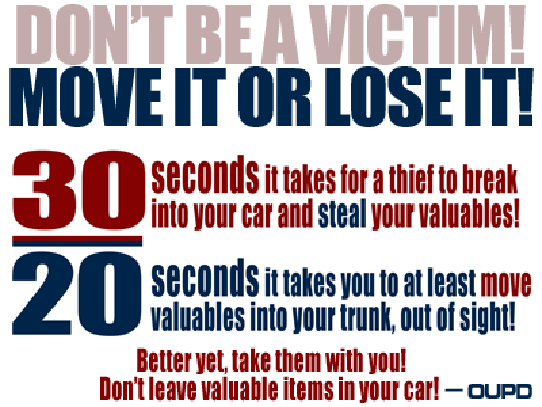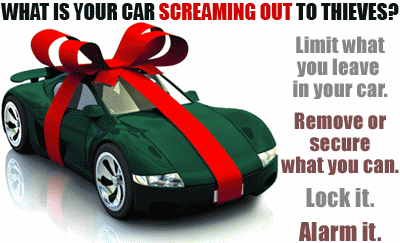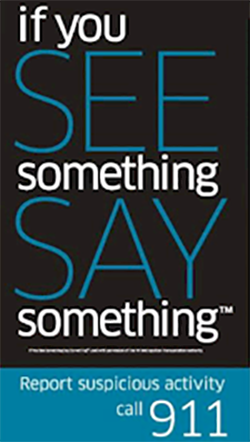Don't be a victim of an auto-burglary!
Most campus auto-burglaries involve smashed windows or other forcible means to gain entry to locked vehicles.
If you bring a car onto campus, one crime you can really help us prevent is auto-burglary. Thefts from vehicles occur at all hours, day and night. All auto-burglaries generally have one thing in common: something to steal ... something valuable left in the car. And, many auto-burglaries are "crimes of opportunity"; they could have been avoided had simple preventative steps been taken.
Campus Auto-Burglary
Prevention Information
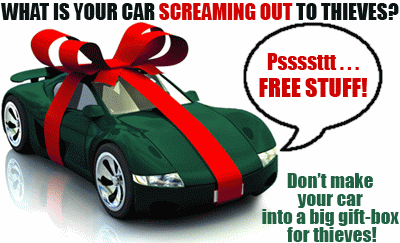
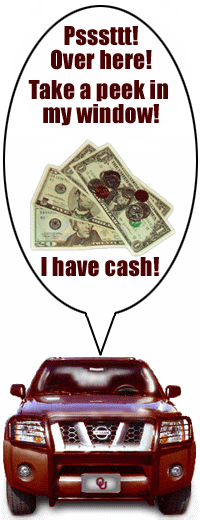
Auto-burglary prevention, like all crime prevention, involves limiting the criminal's ability and/or opportunity to commit the crime. With very little time and effort, you can make a huge difference in your vulnerability to auto-burglary.
It generally takes a mere few seconds to secure your valuables, but it will take only a few seconds more for a thief to break in and steal valuables left in plain sight.
AUTO-BURGLARY
PREVENTION TIPS...
The first thing you can do to help: Don't leave valuables in your car - particularly not in plain sight!
Are your valuables VISIBLE?
Don't be the next car burglary victim!
The last thing you need is to find your vehicle's window broken or items missing. We suggest taking these simple but important steps to maintain your car's safety:
Don't leave valuables in your car. That sounds like "common sense", but drivers/passengers do leave items of value in plain view every day. If you leave valuable items visible in your car, your car is automatically a target.
If you must leave valuable items in your car while out and about, place items out of sight before reaching your destination or move them inconspicuously. This includes packages, backpacks, gym bags, GPS units, MP3 players, and so forth. Someone may be watching when you put items under a seat or throw something over them. An opportunistic thief is on the lookout for trunk-packing, and can break into your car the minute you're out of sight.
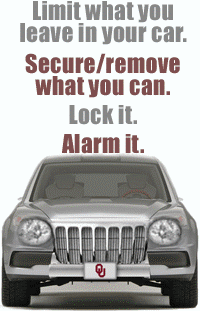
If you can't take them with you, at least lock the items in your glove compartment (if capable of locking and large enough) or your trunk (if you have one).
One reason SUVs and pickups are common auto-burglary targets is because they don't have a "trunk" to hold valuables — the driver/passenger generally just "hides" their valuables "out of sight". The thieves know this, and do check glove compartments, behind seats, and under seats. It only takes a few seconds to check all the "usual" hiding places.
Unobtrusively locking everything valuable "in the trunk" (if you have one) may be difficult when you're combining errands at multiple destinations. Certainly avoid leaving packages or shopping bags visible in your car — lock them in the trunk out of sight if you have to leave packages in your car unattended. Plan your shopping/errands so that you don't load your trunk until you are ready to drive to another destination; never open a trunk, fill it full of valuables, close it, and then just walk away.
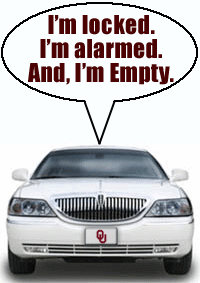
Taking advantage of free home delivery offered by many merchants is one way to protect your purchases while making your shopping far more enjoyable.
Keep your car in good operating condition and always have plenty of gas to get "there and back" (it costs no more to keep the top quarter of the tank filled than to keep the bottom quarter-tank filled!); you don't want to have to leave your car (and valuable contents) sitting along the side of the road if that can be avoided.
Once home, unload your valuables immediately. Do not store valuables in your car any longer than necessary, and certainly never overnight.
If your trunk can be opened from inside your car without a key, lock this feature when you are not in your car or have it disabled, if possible.
Leave no trace. Don't leave any "sign" that there might be valuables "out of sight" in your vehicle, such as docking stations or connector cables. Leave nothing in "plain sight" that might make your vehicle worth "investigating" by a thief; not even loose coins or a CD.
Just leaving an empty docking station in plain sight, even if you've taken the high dollar component with you, may end up costing you hundreds of dollars to replace a broken window because the thief wanted to check your car for "hidden" valuables. Very few auto break-ins are "random" — the thieves see "something" in plain sight that's valuable, or hints of possible hidden valuables.
If you have an after-market stereo/CD-player with a removable faceplate, remove it. Without the faceplate, the unit is less attractive/useful to many thieves, and harder to "fence". If the unit can be pulled, pull it! Take it with you. Just covering a valuable radio (or ANY valuables in your car) with something (like a blanket or towel) to hide it will probably only draw thieves' attention.
Try to park in busy, well-lighted areas. Try to park in well-traveled areas. Large anonymous lots are hit by thieves much more often than parking immediately adjacent to residential housing or other occupied buildings. On a busy campus, day or night, "picking" your parking spot is easier said than done — but try to choose a well-lighted, visible, parking spot where there is lots of vehicular and pedestrian movement when possible. Auto-burglars prefer breaking into cars where they will not observed or attract notice, and choose their targets accordingly.
Lock ALL your vehicle's doors even if you plan to be gone for only a brief time. Every year, we have items stolen from unlocked vehicles where the owner was only going to be gone "just for a second". It only takes seconds to steal your stuff! It's not at all uncommon for thieves to walk down a row of parked vehicles and check vehicle doors to see if they are unlocked. Don't leave any window open or even cracked open, including vent/wing windows and sunroofs.
While criminals can make a career of auto-burglary, often leaving visible valuables in a car, an unlocked car, or with a window not completely rolled up, will present a “can’t-pass-up” crime of opportunity to the immature in your community. Don’t tempt nardowells, drug users with a daily habit to fund, or local juveniles with even a moment of bad judgment
Set any alarm or anti-theft device. If you have one, use it! Many people believe that car-alarms no longer make a difference, but they can be an effective deterrent to an auto-burglar, who most often chooses the easiest target. If they have two cars to choose from, one with an alarm and one without, they will likely burglarize the one without (unless you've left out valuables just too good to ignore!)

Locking your car and setting your alarm is just part of the solution. Even if locked and alarmed, if you leave valuables (or the hint of valuables) in plain sight, a thief may target your car, even knowing it's locked and alarmed. But, without a clear prize in sight, a locked/alarmed car will likely be bypassed for an easier "target of opportunity".
Don't think your dark tinted windows will hide your valuables. Thieves often use flashlights to see through tint, and after-market tint is handy to keep all the broken glass in one "sheet" when they break out your window (and toss the broken window into your back seat or passenger seat to hide the evidence of the break-in from passersby).
Don't use "hide-a-keys". Thieves know the best places to hide those. But remember, just "locking" isn't enough. Keep your car OFF the target list of the thieves by keeping all hints of valuables totally out of sight. If they see something tempting, they certainly can break in.
What Items are Most Commonly Stolen from Vehicles?
Backpacks, gym bags, briefcases, day-planners
Cash/coins, checkbooks and credit/debit cards
Wallets and purses (even when hidden under a seat or in an unlocked glove compartment)
Laptop computers, iPods and MP3 players, (and docking stations)
Cell phones (and chargers)
Portable GPS navigation systems
Stereo/CD players (and faceplates), amps, speakers (even when bolted down!)
Jewelry, keys, mail (identity theft), tools
Anything of obvious value.
Mark your valuables!
As a last line of defense (not really to prevent theft as much as to aid in recovery), mark your valuables. Recording serial numbers is dandy, but nowadays many serial numbers are on removable "labels", rather than "engraved" into valuable items. Also, a serial number doesn't "directly" link you to your stolen property. We'd suggest inscribing/engraving a "personal identifier" on all valuables.

Don't use your social security number (identity theft) — use your driver's license (DL) number, prefaced by your DL "state", such as "OK1217454928". With that marking, any police officer can trace your valuable back to you, wherever it's recovered, and the chances of being reunited with your stolen valuables is dramatically increased. For more information on marking your valuables, visit our "Operation ID" webpages.
What to do if something is stolen out of your car
As soon as you notice something's stolen (or that your car has been broken into) do not touch/adjust anything in, on, or around the car. As soon as possible, call the police to report the incident.
Report Suspicious activity
If you see suspicious activity, report it to OUPD at 325-1911. If you call 911 and an operator asks you "What city?" — reply "OU" or "University of Oklahoma Norman Campus".
"Suspicious Activity" would include:
- persons walking up and down aisles of parking lots looking into cars or trying door handles, vehicles cruising parking lots at very slow speeds for extended periods while observing parked cars (this is not an unusual pattern on campus as students, faculty and staff hunt for parking spaces; there should be other indicators of apparent ill intent)
- persons making any kind of mark or placing anything ON parked vehicles,
- persons sitting in running parked cars for protracted periods, and vehicles dropping one person off while continuing to cruise the same area. We'd prefer to check on an innocent citizen going about their business than to not check and end up taking theft-from-vehicle reports.
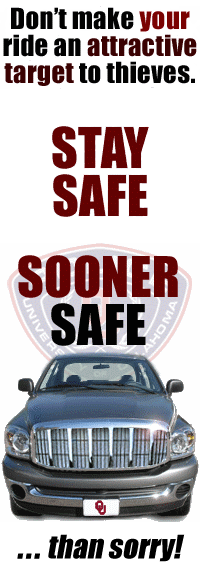
If you have questions concerning vehicle burglaries or other crimes, please contact the OU Police Department at 325-2864 or by to OUPD Crime Prevention and Community Relations unit by email: mail-crimeprev@ou.edu Should you need to report an in-progress crime, please call 325-1911, or 911.
For non-emergency reports, please call 325-2864. This is also the number we suggest you program into your cell phone for non-emergency calls regarding on-campus crime/problems. For use in on-campus emergencies, program your cell phone to 325-1911 to insure you reach OUPD's 911 dispatcher, avoiding unnecessary delays due to cell towers mis-routing your call to another public safety dispatch center. If you have a non-local cell phone, use (405)-325-1911.
Don't hesitate to call OUPD to report ANY suspicious activities, persons or vehicles. OUPD officers cannot be everywhere, and we count on good people to be our "eyes and ears" and report suspicious activities as they are occurring. Do your part by taking preventive action and spreading the word. You can make a difference.
A final word: Do NOT confront anyone.
Your life is precious; property can be replaced!
BE ALERT,
BE AWARE,
and be prepared to BE A GOOD WITNESS.
